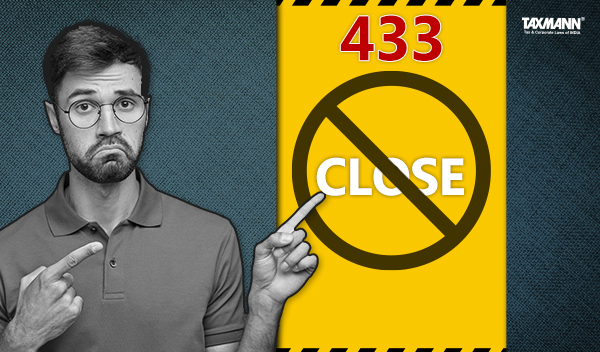A Company is Not Liable to Be Wound Up U/s 433(E) of Cos. Act 1956 in Respect of Debts That Are Disputed | HC
- News|Blog|Company Law|
- 2 Min Read
- By Taxmann
- |
- Last Updated on 10 April, 2024

Case Details: Rahul Kulshreshtha v. Triveni Media Ltd. - [2024] 161 taxmann.com 281 (HC - Delhi)
Judiciary and Counsel Details
- Vibhu Bakhru & Amit Mahajan, JJ.
- Ms Neha Gupta & Rishabh Pant, Advs. for the Appellant.
- Nilesh Jain, Adv. for the Respondent.
Facts of the Case
In the instant case, the appellant joined the respondent company on 01.06.2007 as a Chief Executive Officer in terms of an appointment letter. The appellant alleged that the respondent stopped paying him salary from Sept 2008 onwards, on the ground that it was suffering losses, and thus, he was constrained to resign from his employment with the respondent in December 2008.
Admittedly, the appellant’s resignation was accepted. He filed a petition u/s 433 of the Companies Act, 1956 claiming an outstanding amount of Rs.80.35 lakhs. The Company Court noted that the respondent confirmed that a sum of Rs.15.96 lakh was payable to the appellant and accordingly, paid the said amount along with an interest to the appellant. Subsequently the Company Court by the impugned order disposed of the said petition.
It was noted that a sum of Rs.2.62 lakh was required to be deposited as a Provident Fund (PF) in terms of the salary slips placed on record. The deposit of provident funds is also a statutory obligation and failure to do so would invite proceedings by the concerned authorities.
High Court Held
The High Court noted that the proceedings u/s 433(e) of the Act would lie only in respect of debts that are admittedly due. Further, a company is not liable to be wound up under section 433(e) of the Act in respect of debts that are disputed.
The High Court held that there was no infirmity with the impugned order passed by the Company Court except to a limited extent that the appellant’s claim regarding statutory dues had not been included in admitted dues.
Further, the High Court directed the respondent to deposit the said amount along with full interest as applicable with concerned PF authorities within a period of 4 weeks and provide evidence for the same to the appellant.
The High Court also held that in the event, that the respondent fails to comply with the said direction, the appellant’s petition would be restored before the Company Court. Thus, the appellant was not precluded from availing its remedies in respect of other claims in accordance with the law.
Disclaimer: The content/information published on the website is only for general information of the user and shall not be construed as legal advice. While the Taxmann has exercised reasonable efforts to ensure the veracity of information/content published, Taxmann shall be under no liability in any manner whatsoever for incorrect information, if any.



 CA | CS | CMA
CA | CS | CMA
